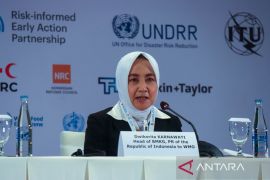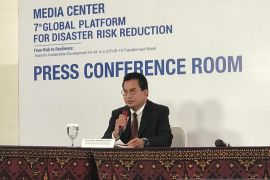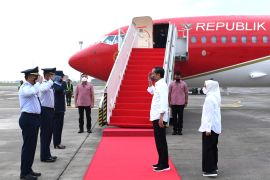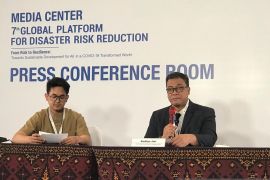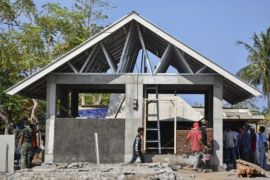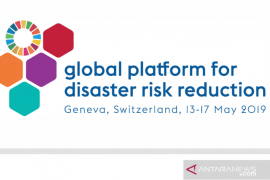. (ANTARA) - Indonesia will host a series of meetings of the 7th Session of the Global Platform for Disaster Risk Reduction (GP2022) which will be held in Bali on May 23-28, 2022.
The event will be hosted by the Government of Indonesia and convened by the United Nations Office for Disaster Risk Reduction (UNDRR).
The Global Platform for Disaster Risk Reduction (GPDRR) is the premier global forum for discussing the Sendai Framework for disaster risk reduction, also known as the Sendai Framework 2015-2030.
The framework, which has been ratified by 187 countries, aims to serve as a global reference for reducing disaster risks around the world in the future.
Now, the GPDRR event for this year session will take place at a very important time, namely seven years since the adoption of the Sendai Framework and more than two years since the beginning of the COVID-19 pandemic.
The current global pandemic has exposed how fundamental social vulnerabilities and inequalities have disastrous consequences for the most vulnerable groups around the world.
For this reason, prevention and an agenda on disaster risk reduction are essential if humanity is to achieve a sustainable future for all.
In this regard, this year's GPDRR session will provide a good and timely opportunity to demonstrate the importance of international solidarity and cooperation, as well as to discuss ways to address risk triggers that can cause disasters, both locally and globally.
In addition, the 2022 GPDRR will explore ways to strengthen disaster risk governance and efforts to build stronger systems to manage all types of risks.
More importantly, the global platform is also a forum for sharing knowledge and discussing the latest developments and trends in disaster risk reduction efforts.
The United Nations General Assembly recognizes the GPDRR as an important mechanism for reviewing progress on the implementation of the Sendai Framework for Disaster Risk Reduction.
Furthermore, through this global platform, governments, the United Nations system and all stakeholders will come together to identify ways to further accelerate the implementation of the Sendai Framework.
Since 2007, six sessions of the GPDRR have taken place, and the results are recognized by the UN General Assembly as a contribution to the deliberations of the High-Level Political Forum on Sustainable Development (HLPF), which is held annually in July.
In doing so, it contributes to risk-based monitoring and implementation of the 2030 Agenda for Sustainable Development.
This year, the GPDRR again offers an opportunity for the government, the UN system and all stakeholders to recommit to -- urgently -- accelerate progress in disaster risk reduction efforts towards achieving sustainable development.
Environmental Protection
UN Special Representative for Disaster Risk Reduction (UNDRR) Mami Mizutori emphasized the importance of efforts to reduce disaster risk along with efforts to protect the environment.
She emphasized that no country was spared from the catastrophic impact of the COVID-19 pandemic and extreme climate events.
"However, the important thing is that both types of disasters can be mitigated through disaster risk reduction," Mizutori said at the 7th GGPDRR preparatory press conference.
Therefore, she added, GPDRR Forum which will be held in Bali in May this year will discuss efforts to build sustainable disaster resilience with environmental protection.
"I think Indonesia is the right host. Although it is vulnerable to disasters and has faced various disasters, (Indonesia) has found ways to address disaster risks at the national and regional levels," Mizutori said.
She further said that political leadership is needed from various top layers of government, both central and local levels, for disaster risk reduction efforts that is coupled with environmental protection.
Mizutori also mentioned that during the UN climate conference (COP26) in 2021, the issue of disaster resilience was become the main focus of discussion.
Meanwhile, at this year's COP27 in Egypt, there is a further discussion on ways and efforts to adapt to climate which are integrated with efforts to reduce disaster risk in a comprehensive manner.
"This kind of discussions are especially important for developing countries, archipelagic countries and small countries," Mizutori remarked.
For this reason, she believes that GPDRR as a global platform will be able to bridge the interests discussed at COP26 and COP27 through discussions related to climate and disaster risk reduction.
In fact, the GPDRR is also a very important global platform for Indonesia as the largest archipelagic country that is very vulnerable to being affected by extreme weather due to the climate crisis.
Besides, Indonesia is located in the Pacific Ring of Fire which is prone to geological disasters such as earthquakes, including earthquakes that can trigger a tsunami.
Therefore, Indonesia hopes that countries around the world can collaborate to build better resilience in the face of various disasters in the future.
Indonesia as the host of the 2022 GPDRR wants to echo the theme "Strengthening Partnerships Towards Sustainable Resilience".
That theme is in line with the big theme of Indonesia's G20 presidency which aims to build a better resilient world so that all can soon recover together from the impact of the COVID-19 pandemic.
For this reason, the Government of Indonesia hopes that the implementation of this year's GPDRR in Bali can be part of global efforts to build resilience towards recovery, as in the G20's theme: "Recover Together, Recover Stronger".
Related news: Learning from Sasak people about disaster mitigation
Related news: Strengthening disaster mitigation through Disaster SNI implementation
Related news: Disaster mitigation needs international cooperation: VP Kalla



